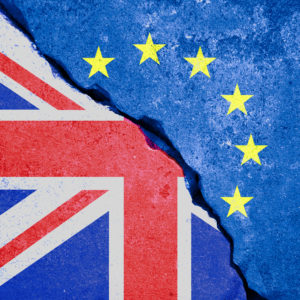BRUSSELS — There’s a joke about a tourist in Ireland asking a local for directions, getting the response: “Well, if that’s your destination I wouldn’t start from here.”
It’s politically true of the island of Ireland just now as Britain extricates itself from the 28-member European Union bloc after 45 years — the border between Northern Ireland (British) and the Republic (Irish) has become a make or break negotiation issue.
The EU has melted European borders so one travels seamlessly across nations and cultures these days. There are no peaked caps to delay the surface traveller with enquiries, even searches.
On a ragged frontier there are lumps of Belgian land found in next-door Netherlands — and vice versa — which are curiosities, not causes for a fight.
Nowhere is free and easy transit more celebrated than in Ireland. The 310 mile border between the six counties of Ulster and the rest of the Irish landmass sees an estimated flow of up to 30,000 commuters every day.
The Centre for Cross Border Studies (Yes!) reckons there are 30 million vehicle crossings annually — and that’s counted traffic. But imagine, if you will, the rolling, verdant landscape whose hedgerows conceal hundreds of “unapproved roads” and pathways where the green line often slices farms and parishes.
“Frontierland” is not a sinister vacuum between two nations but the name of an amusement arcade on one of the main roads. “We live in the shadow and the shelter of one another,” says the Irish Republic’s president, Michael D. Higgins.
For 95 years the border has been freely open for people. And for goods since 1993.
Folklore about the misty days of smuggling is still relished on the Emerald Isle. As a child postwar I travelled on the “Flying Enterprise” express between Belfast and Dublin; going North on this mere 87 mile axis, Mom stuffed my rucksack with illegal silk stockings, Sweet Afton cigarettes and candy (my reward).
Customs officers never thought to examine a kid’s luggage — unlike international trains on the European continent. Back then frontiers meant opening suitcases, showing tickets, passports, buying sandwiches, waiting for the locomotive change and the train car wheels to be tapped — all denying the night train was a “Sleeper.”
With the prospect of the United Kingdom leaving the European Union, there are many Irish fears of what it will do to their current, diaphanous border. Northern Ireland will be broken off like a biscuit from the rest of the island and two different customs regimes are likely.
“We have seen no evidence to suggest that, right now, an invisible border is possible,” barked the House of Commons committee on Northern Ireland Affairs, adding they had failed to find an electronic, rather than an infrastructural customs system, “anywhere in the world.”
But the political cost of red and white booms across roads, plus inevitable sheds and carparks for lorry inspection and customs officers, would be toxic. That’s for sure on the 20th anniversary of the Good Friday Agreement, which brought peace to bloodied Northern Ireland.
The Centre for Border Studies warns commuters and traders “will inevitably experience significant change in the environment for cooperation and mobility due to customs controls, and the potential for an increase in both smuggling and other forms of organized crime.”
A European Commission official involved in the so-called “Brexit” negotiations comments: “Frozen pizza without cheese will cross the border more easily; otherwise there will be rigorous checks. Every consignment that is animal-based will need to be examined.”
Bristling with negotiation “red lines,” British Prime Minister Theresa May is the Queen of Wishful Thinking; few others are upbeat about the Northern Ireland border after Britain quits the European Union. Will a fractious frontier return?
A “backstop” arrangement for Ireland and Northern Ireland to maintain the status quo even after Britain’s EU departure has been agreed if no other solution is found. But an aide to former Prime Minister Tony Blair doesn’t think much of that.
“Huge concrete slabs and checkpoints on the main roads could force Northern Ireland back into identity politics,” Ireland expert Jonathan Powell hints ominously. “The border issue could bring the entire Brexit negotiation crashing down.”

